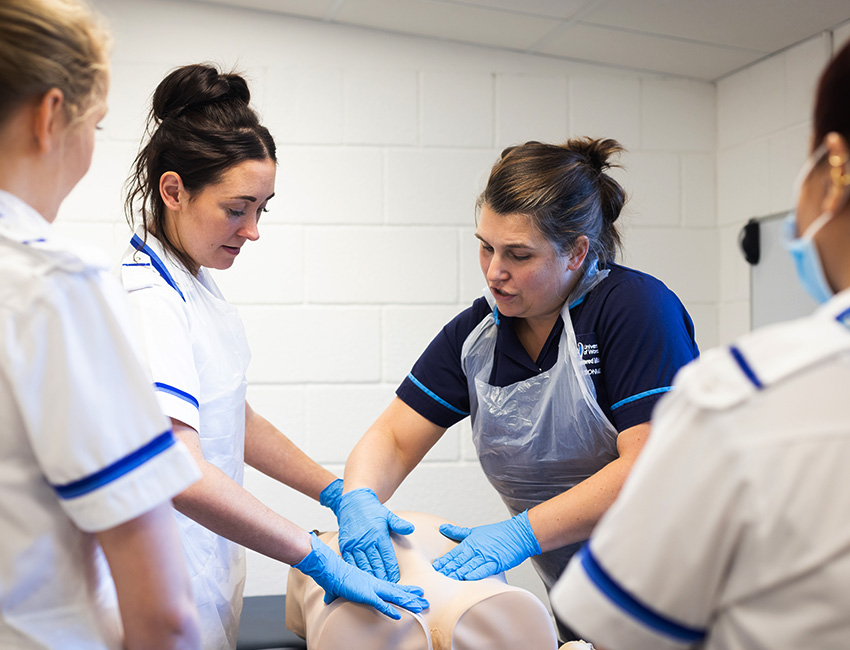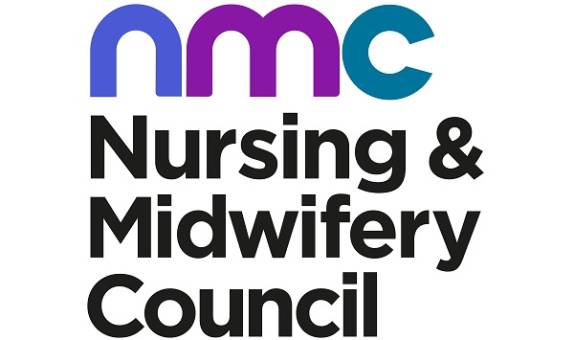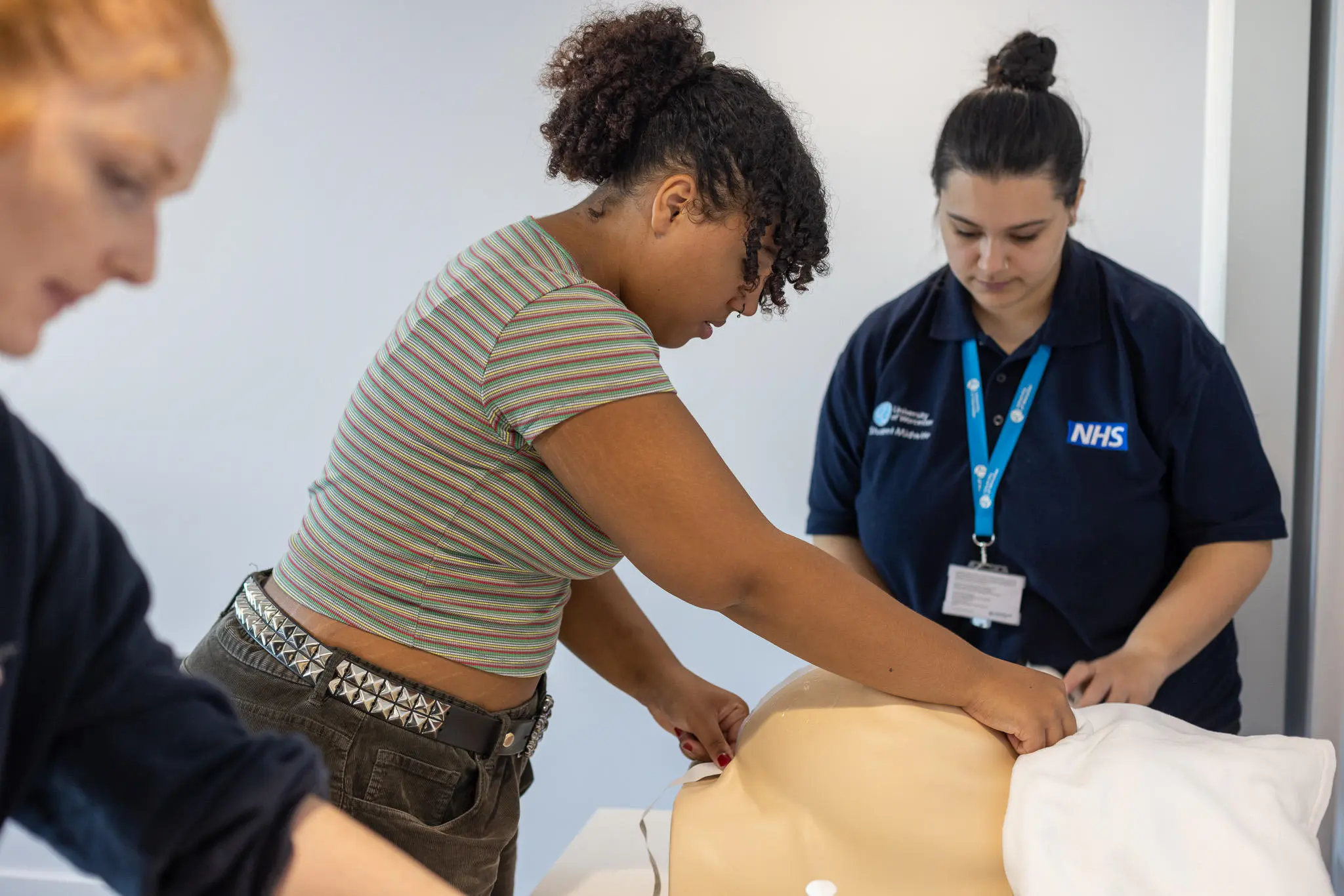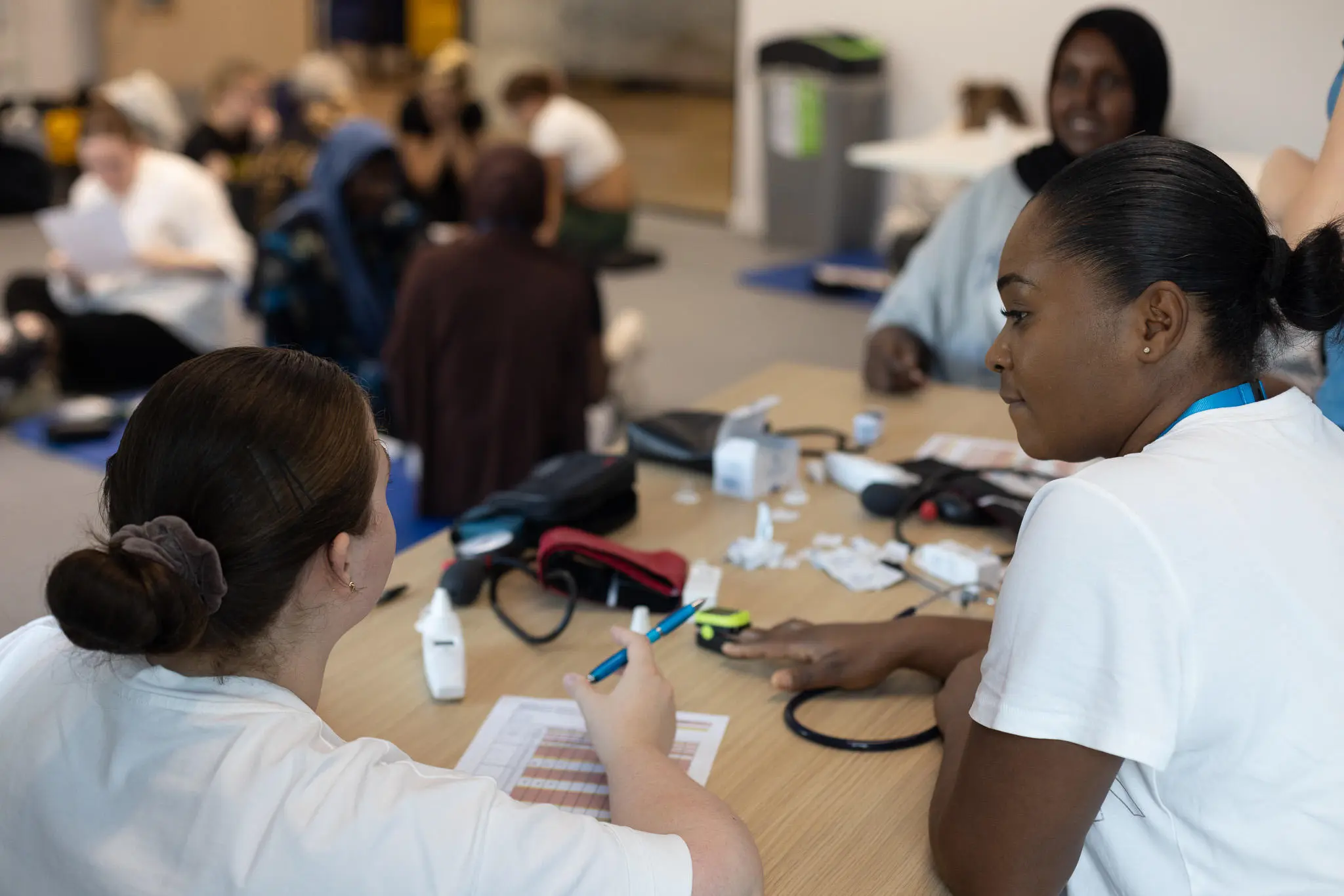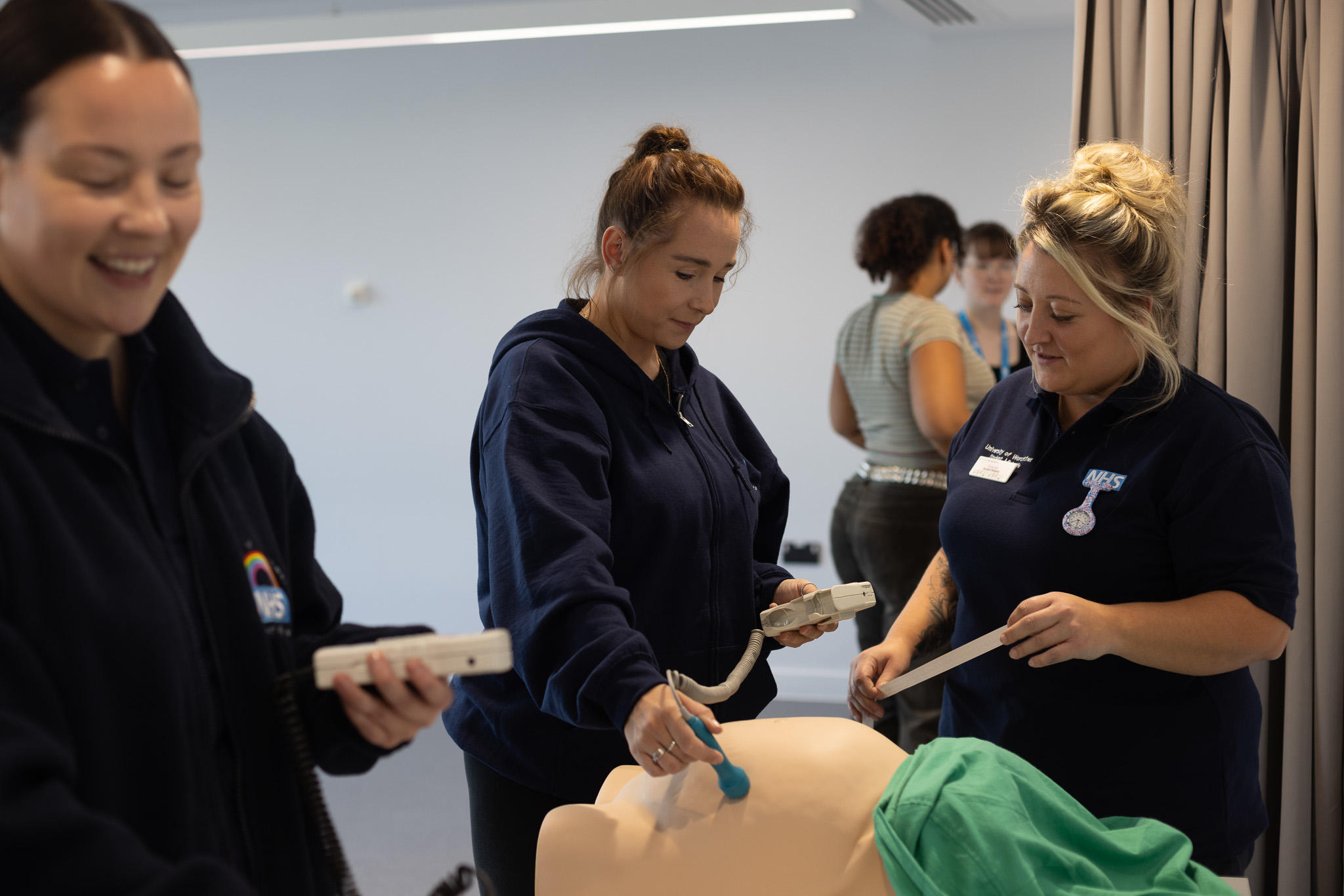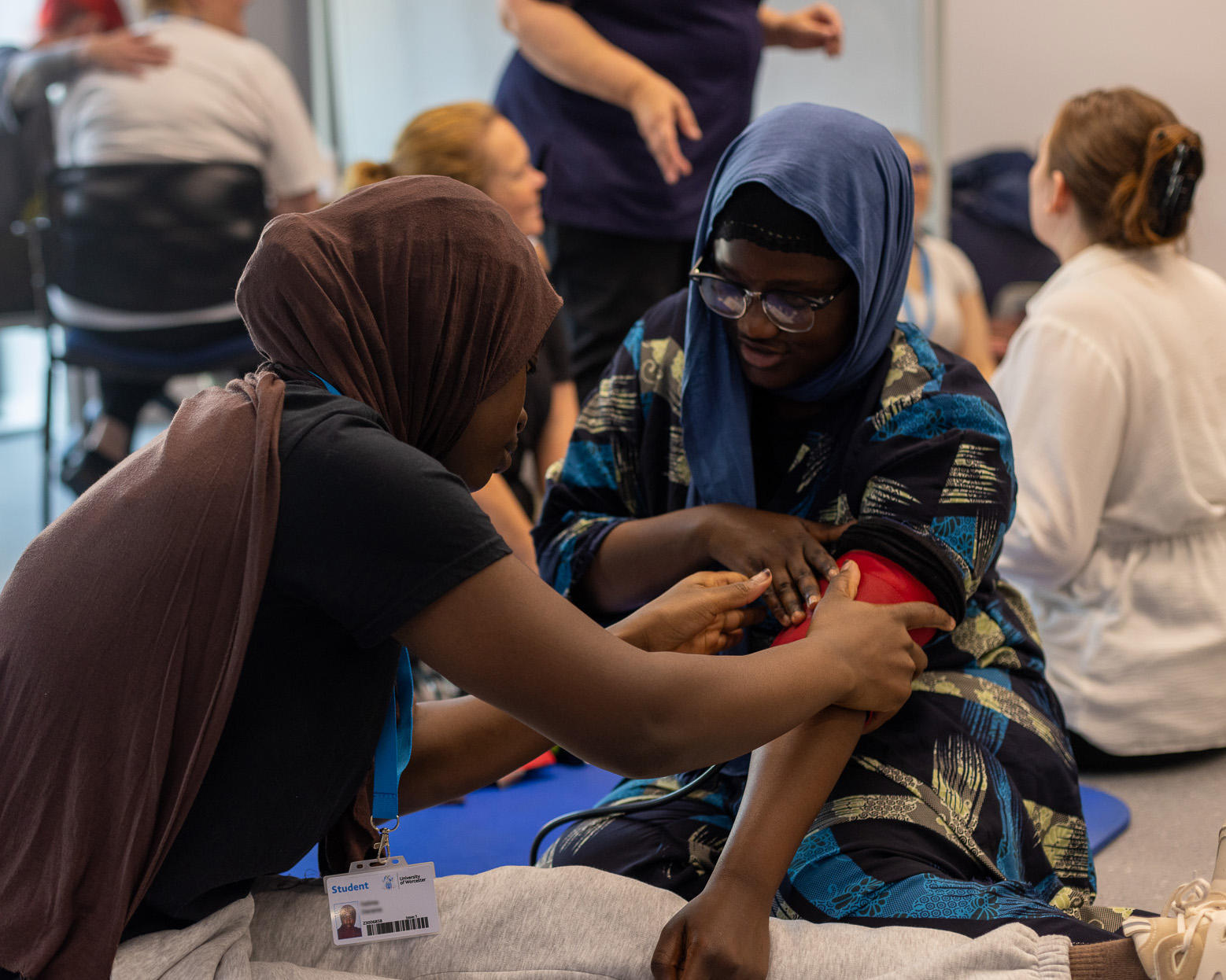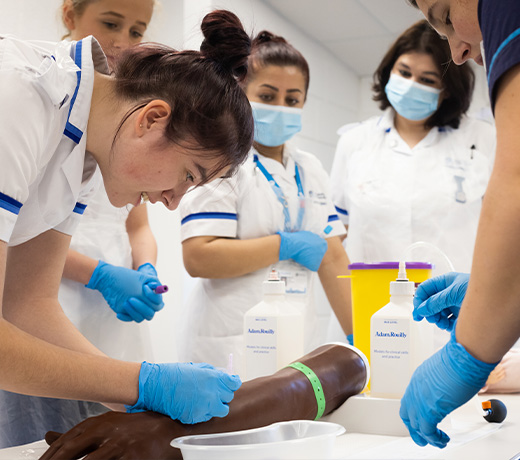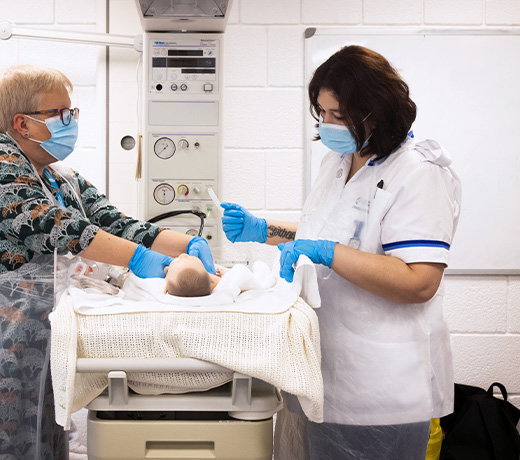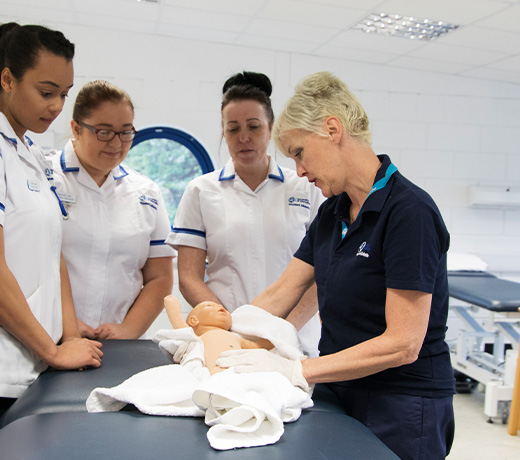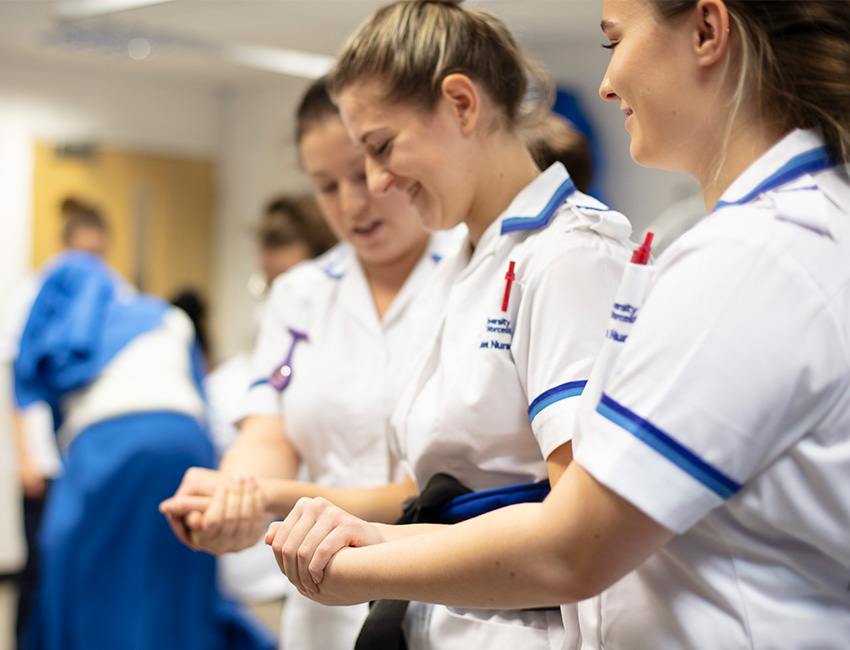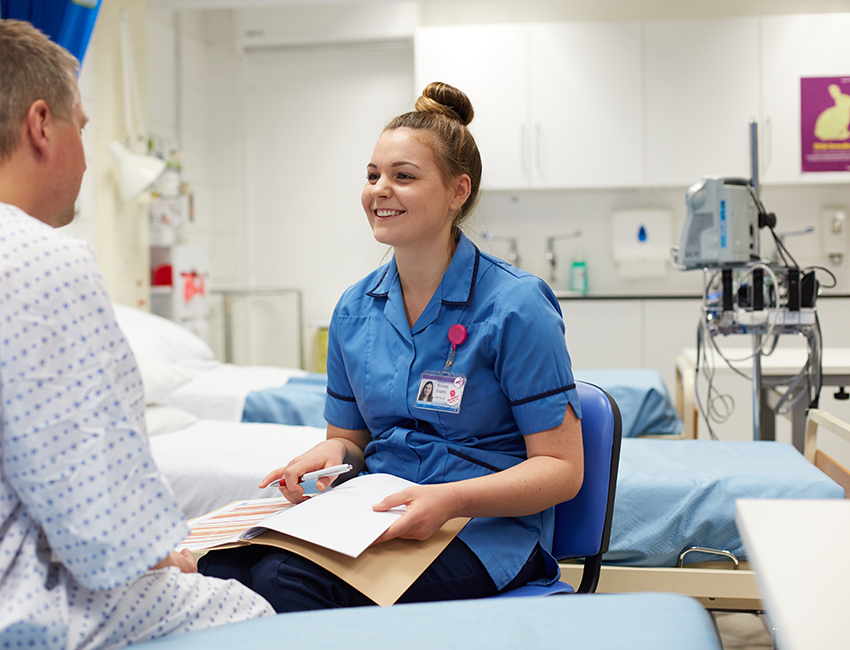Midwives enjoy the privilege of a career caring for mothers, babies and the whole family. At Worcester, you’ll not only gain the skills and experience needed to become a confident, competent and caring midwife, you’ll also develop the intellectual tools to help you shape the future direction of the profession.
of graduates are in work 15 months after the course
grant that you won't need to pay back
With this degree you’ll be eligible to register as a midwife with the NMC, the professional regulatory body for midwives.
Overview
This is a three year full-time degree, each year is 45 weeks with seven weeks designated holiday.
You’ll split your time between learning on campus and developing your skills on placement. On campus, our skills and simulation centre will allow you to practice midwifery interventions safely and confidently. You’ll learn from experienced midwives who are supported by professionals from the midwifery service, giving you access to specialist knowledge in a range of areas including perinatal mental health, genomics and leadership.
Learning takes place through a blend of live teaching and activities you can complete in your own time. Lectures, skills sessions, tutorials and discussions sit alongside digital resources and reflective tasks, offering flexibility and encouraging you to take an active role in your learning.
Real stories and real scenarios from women and families are woven throughout the course to help you understand the experiences behind the care you’ll provide. This approach encourages thoughtful, compassionate practice. Simulations and case studies mirror real‑life situations, and regular feedback in the simulation suites, designed to replicate hospital, home and community settings, supports the development of your skills in a safe, supportive environment.
Placements
Around half your course will be spent out on placement, allowing you to complete 2,300 hours of clinical experience by the time you graduate.
We have excellent links with NHS Trusts and healthcare providers in the region. Our aim is to arrange placements and visits to a diverse range of hospitals and community settings during your three years on the course.
While out on placement you’ll learn from experienced midwives and have lots of support from your tutors. You’ll work a 37-hour week, experiencing the range of hours expected of a registered midwife – including evenings, nights, weekends and bank holidays.
These practical experiences, in combination with your time on campus, will prepare you to be a skilled, compassionate and confident midwife.
Course content
On this accredited course you’ll study theories backed up by substantial evidence, and then get the opportunity to apply this learning in professional practice.
We regularly review our courses to reflect the latest research and developments in the subject area, as well as feedback from students, employers and the wider sector. As a result, modules may change to ensure the course remains current and relevant.
All modules are mandatory to ensure you’re eligible to register as a midwife with the NMC.
Careers
This course will prepare you for registration with the Nursing and Midwifery Council, so you can begin a rewarding career in midwife.
As a graduate midwife you'll be in demand and can expect to get an NHS position as a Registered (Graduate) Midwife (NHS Band 5). After several years, you could progress to be a ward-based manager, specialist midwife, researcher, or lecturer.
Midwives work in trust obstetric maternity units, midwife led units or in the community. Some also specialise in roles such as a diabetes specialist midwife, bereavement services, vulnerable women, or safeguarding.
This is an internationally recognised qualification, so you could also look for a midwife position in Europe as well as many other countries.
During the final year of the course the academic team and your Personal Academic Tutor will support you with career planning, writing personal statements and even give you opportunities to complete mock interviews. You’ll be in the best possible position to secure your perfect job.
Continuing professional development includes the opportunity to undertake postgraduate academic study, including our Midwifery MPhil/PhD.
Course highlights
Teaching and assessment
Teaching is a mix of interactive seminars, lectures, one-to-one tutorials, and practical skills sessions. Your assessments will help prepare you for a career as a midwife, and include observations of professional skills, writing reflective essays, presenting, group discussions and creating care plans.
Teaching and assessment contents
You are taught through a combination of structured lectures, seminars, case studies, directed and independent study, group work including scenario, problem and enquiry-based learning, and group and individual tutorials, with the additional support of e-learning strategies using the virtual learning environment. There will be input from other agencies, service users and professionals as appropriate.
A particular feature of the programme is the opportunities for clinical skill and simulated learning including role play, and ‘hands-on’ practical skills sessions using a range of simulation manikins. Formative feedback on performance is provided to facilitate safe and effective support for essential skills development, in the simulation suites, replicating hospital, home and community practice learning environments
Practice learning experiences in a range of hospital and community settings, including flexible placements using a complementary placement week to maximise the learning opportunities offered by diverse and non-traditional settings. Students will complete a minimum of 2300 hours of clinical experience over the three years.
Students will work a 37-hour week, experiencing the range of hours expected of Registered Midwives and this will include evenings, nights, weekends and bank holidays.
"Being able to be part of a person's pregnancy journey is always an honour. These women and their new families are experiencing a life changing process whether it be antenatally or during labour and supporting them to birth their baby, we have the potential to make such a difference in their experience and it is a pleasure to be able to call this our job.”
Entry requirements
UCAS tariff points required: 120
Plus 5 GCSEs (including English and Maths) at grade C/4 or above. Functional skills level 2 Mathematics is accepted as an alternative. Please note that functional skills level 2 English is not accepted. Those applying via an Access course only need to meet the requirements for English and Maths.
UCAS tariff points can come from:
- A-levels (BBB) or the UCAS tariff equivalent. Must include a minimum of one relevant subject e.g. Biology, Chemistry, Psychology, PE, Sociology, or Health and Social Care
- BTEC Nationals Extended Diploma (DDM) Health & Social Care preferred
- Access to Higher Education Diploma: 45 level 3 credits – 24 at distinction and the remainder at Merit
- T-level (Merit) in a relevant subject e.g. Health, Healthcare Science and Science
Other additional qualifications may be considered. Work out your estimated points with the UCAS tariff calculator.
Any questions?
If you have any questions about entry requirements, please call our Admissions Office on 01905 855111 or email admissions@worc.ac.uk.
Fees
Fees contents
UK and EU students
The Government has announced that it will increase tuition fees and maintenance loans by 3.1% from the 2025/26 academic cycle. Subject to approval, the University intends to increase our tuition fees in line with this and as per our terms and conditions. This means that from September 2025 the standard fee for full-time home and EU undergraduate students on BA/BSc/LLB degrees and FdA/FdSc degrees will be £9,535 per year for new and continuing students.
For more details on course fees, please visit our course fees page.
International students
The standard tuition fee for full-time international students enrolling on BA/BSc/LLB degrees and FdA/FdSc degrees in the 2025/26 academic year is £16,700 per year.
For more details on course fees, please visit our course fees page.
How to apply
How to apply contents
Applying through UCAS
Midwifery BSc (Hons) B720 BSc/Mid
UCAS is the central organisation through which applications are processed for entry onto full-time undergraduate courses in Higher Education in the UK.
Read our How to apply pages for more information on applying and to find out what happens to your application.
Recruitment for this course considers not only the values of the specific profession you are wishing to join, but also the values outlined in the NHS constitution. You can expect to be shortlisted and interviewed based upon these values as well as course/profession specific requirements.
The 6 Cs can be used to support your knowledge of these core values prior to submission of your UCAS/application form or interview.
Contact
If you have any questions, please get in touch. We're here to help you every step of the way.

Midwifery admissions
Midwiferyadmissions@worc.ac.ukAdmissions Office
admissions@worc.ac.uk01905 855111More to explore
Open Days
Visiting us is the best way to get a feel for student life at the University of Worcester.

The City of Worcester
Worcester is a welcoming university city with great transport links and plenty of student parking.

Accommodation
Benefit from our accommodation guarantee. We have rooms on campus to suit every budget including en-suite options.

